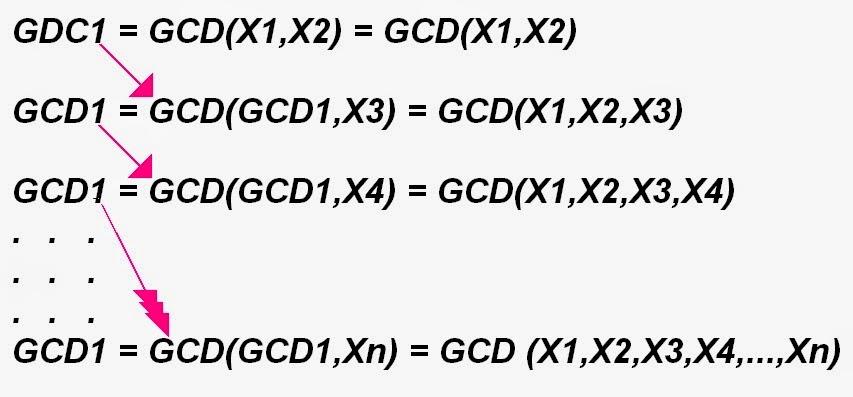To find the GCD of numbers using Euclid's algorithm is very easy. Let us discuss this algorithm first.
Simply put, when we have two numbers x and y, the larger one(y1) is either divisible by the smaller one(x1) or it isn't (More often than not).
This is the simplest scenario.
Now, if we have a remainder (i.e. a non-zero modulus), we replace this as the next x1 value and use the previous x1 as y1( i.e. the new larger number). Now, we continue this process till we get a remainder of zero.
In the program, I have added a loop to find the GCD of more than two numbers. The GCD of three numbers is the GCD of the GCD of the first two numbers and the third number. We continue taking the GCD of the GCD of the numbers included so far and the new number added till we have included all the numbers.
Simply put, when we have two numbers x and y, the larger one(y1) is either divisible by the smaller one(x1) or it isn't (More often than not).
If y|x,
then gcd (x, y) = x.
This is the simplest scenario.
Now, if we have a remainder (i.e. a non-zero modulus), we replace this as the next x1 value and use the previous x1 as y1( i.e. the new larger number). Now, we continue this process till we get a remainder of zero.
If y1 = x1.q + r, for integers q and r, then gcd (x1, y1) = gcd (x1, r)
This way, we continue replacing values of y1 and x1, till we get the GCD. |
| The values of X and Y are updated till we get the remainder zero. |
 |
| Finding the GCD of a Set of Numbers |
Now for the Fortran program,
!To find the GCD of the given numbers
program gcd_all
integer, allocatable :: a(:)
integer n,gcd1, largenum
largenum=100 !To read numbers from source file
n=0
allocate (a(n))
do i=1, largenum
open (1,file='gcd.dat')
read (1,*, end=10) a(i)
n=n+1
end do
10 write (*,20) "Finding the GCD of ",n," numbers" !To display the input
20 format (A,I3,A)
write (*,*) "The numbers are"
write(*,*)
do i=1,n
write (*,*) a(i)
end do
gcd1=a(1)!To find the GCD
do i=2,n
gcd1=gcd(gcd1,a(i))
end do
write(*,*)
write(*,*) "The GCD is ",gcd1
contains !To create the GCD function to be used in the previous section
integer function gcd(x,y)
integer x,y
y1=max(x,y)
x1=min(x,y)
do
if (mod(y1,x1)==0) then
gcd=x1
return
exit
else
temp=x1 !Assigning x1 and y1 values without using a temp variable gives wrong results
x1=mod(y1,x1)
y1=temp
end if
end do
end function gcd
end program gcd_all
!To find the GCD of the given numbers
program gcd_all
integer, allocatable :: a(:)
integer n,gcd1, largenum
largenum=100 !To read numbers from source file
n=0
allocate (a(n))
do i=1, largenum
open (1,file='gcd.dat')
read (1,*, end=10) a(i)
n=n+1
end do
10 write (*,20) "Finding the GCD of ",n," numbers" !To display the input
20 format (A,I3,A)
write (*,*) "The numbers are"
write(*,*)
do i=1,n
write (*,*) a(i)
end do
gcd1=a(1)!To find the GCD
do i=2,n
gcd1=gcd(gcd1,a(i))
end do
write(*,*)
write(*,*) "The GCD is ",gcd1
contains !To create the GCD function to be used in the previous section
integer function gcd(x,y)
integer x,y
y1=max(x,y)
x1=min(x,y)
do
if (mod(y1,x1)==0) then
gcd=x1
return
exit
else
temp=x1 !Assigning x1 and y1 values without using a temp variable gives wrong results
x1=mod(y1,x1)
y1=temp
end if
end do
end function gcd
end program gcd_all
 |
| Sample Output |
I ran this program but got a warning at first about comparing floating point numbers in the mod function so I typed x1 and Y1 as integers, and it ran without incident. However, without that change the compiler issued the warning and at the end of prog. execution an exeption flag was raised.
ReplyDelete